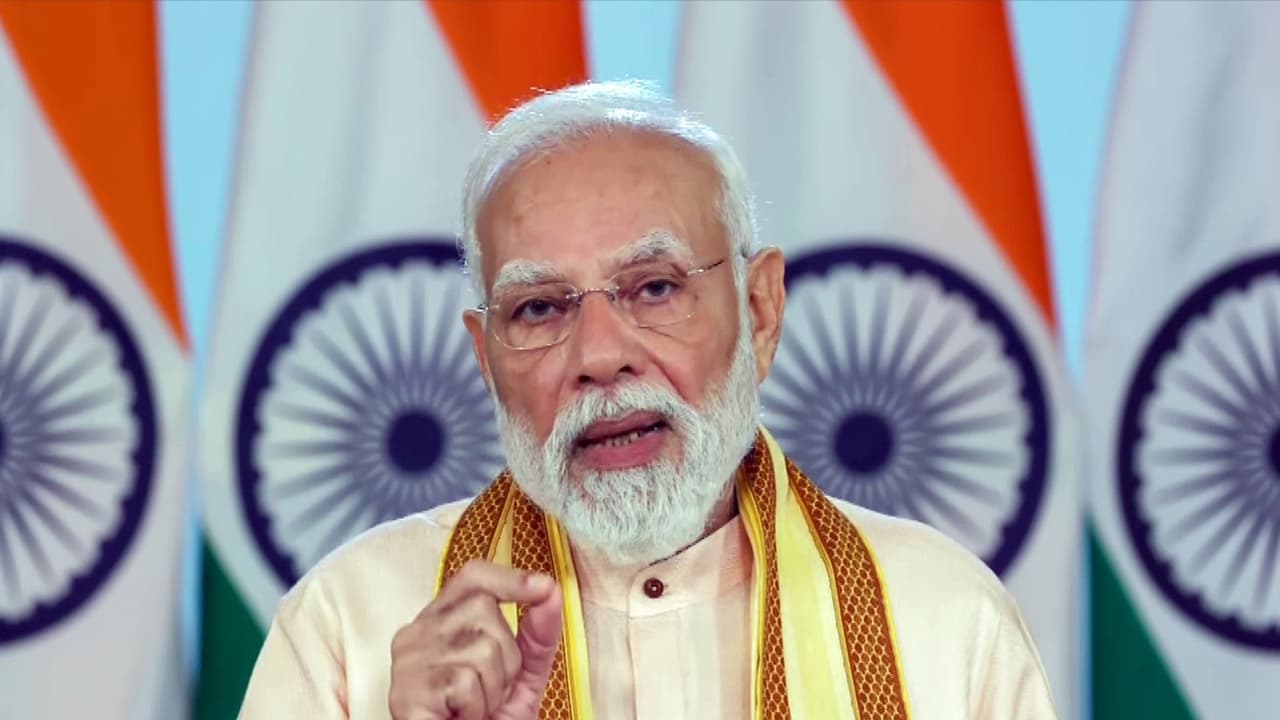Top Stories
PM Modi Calls for Liberation from Colonial Mindset in Education

Prime Minister Narendra Modi addressed the need for India to free itself from what he called the “slavery mindset” instilled by British colonial influence during a recent lecture in New Delhi. Speaking at the sixth Ramnath Goenka Lecture, organized by The Indian Express, Modi emphasized the importance of reviving India’s traditional education system, which he believes fosters pride in its culture alongside learning and skill development.
The Prime Minister articulated that India’s education, economy, and societal aspirations have historically aligned with foreign models due to British influence. He stated, “Today’s India is impatient—impatient to become developed, impatient to become self-reliant.” This impatience, he argued, drives the nation toward progress and change.
Economic Resilience Amid Global Challenges
Modi highlighted that the last few years have been fraught with global challenges, particularly referencing the impact of the COVID-19 pandemic in 2020, which disrupted economies worldwide. Despite these hurdles, he noted India’s resilience, stating that the country’s growth rate remained strong even amid crises, such as the European energy crisis in 2022 and ongoing instability in West Asia.
He remarked, “At a time when the world is fearful of disruption, India is confidently moving in the direction of a bright future,” asserting that India is not merely an emerging market but an “emerging model.” Modi attributed this growth to a focus on development and urged state governments to foster a competitive environment that encourages investment and enhances ease of doing business.
A Call for Inclusive Governance and Social Justice
In his address, Modi underscored the importance of development-focused governance as a means to foster trust among citizens. He cited recent electoral results in Bihar, where voter turnout, particularly among women, reached historic levels. He interpreted these results as an indication of public faith in democracy and an affirmation of citizens’ aspirations for development.
The Prime Minister urged all state governments—regardless of political affiliation—to prioritize development, stating that the quality of governance today will shape the future of political parties. He expressed concern over past governance failures in Bihar, noting that the opposition had squandered years of public trust.
Modi also emphasized the necessity of social justice, arguing that true development must include the marginalized and disenfranchised. He highlighted government initiatives such as the construction of 12 crore toilets and the establishment of 57 crore Jan Dhan bank accounts, which have aimed to empower the underprivileged.
He stated, “When government schemes reach the Dalits, the oppressed, the exploited, and the deprived, true social justice is ensured.” The Prime Minister pointed out that nearly 94 crore Indians now benefit from social security schemes, a significant increase from 25 crore a decade ago.
Modi also touched upon the Aspirational Districts Programme, aimed at transforming backward districts into thriving communities. He noted that a new strategy, involving tailored development plans and the deployment of the best officers, has led to notable improvements in these areas.
In addressing issues such as Naxalism, Modi asserted that the influence of Maoist extremism is waning in India, although he criticized the opposition for allegedly supporting such movements. He claimed that urban Naxalism has taken root within opposition parties, warning that this poses a threat to national unity.
Lastly, Modi turned to the historical context of India’s education system, specifically referencing Thomas Babington Macaulay and his efforts to reshape Indian education in the 19th century. He argued that Macaulay’s vision led to a detrimental mindset that undermined indigenous knowledge and culture.
In a call to action, he urged citizens to liberate themselves from this colonial mindset, emphasizing the importance of cultural pride and the preservation of local languages. Modi affirmed that the government supports Indian languages while recognizing the role of English in a global context. He concluded with a pledge for citizens to work towards eradicating the legacies of colonialism in India’s educational and cultural frameworks by 2035, marking two centuries since Macaulay’s reforms began.
-

 World4 months ago
World4 months agoSBI Announces QIP Floor Price at ₹811.05 Per Share
-

 Lifestyle4 months ago
Lifestyle4 months agoCept Unveils ₹3.1 Crore Urban Mobility Plan for Sustainable Growth
-

 Science4 months ago
Science4 months agoNew Blood Group Discovered in South Indian Woman at Rotary Centre
-

 World4 months ago
World4 months agoTorrential Rains Cause Flash Flooding in New York and New Jersey
-

 Sports4 months ago
Sports4 months agoBroad Advocates for Bowling Change Ahead of Final Test Against India
-

 Top Stories4 months ago
Top Stories4 months agoKonkani Cultural Organisation to Host Pearl Jubilee in Abu Dhabi
-

 Science4 months ago
Science4 months agoNothing Headphone 1 Review: A Bold Contender in Audio Design
-

 Top Stories4 months ago
Top Stories4 months agoAir India Crash Investigation Highlights Boeing Fuel Switch Concerns
-

 Sports4 months ago
Sports4 months agoCristian Totti Retires at 19: Pressure of Fame Takes Toll
-

 Business4 months ago
Business4 months agoIndian Stock Market Rebounds: Sensex and Nifty Rise After Four-Day Decline
-

 Politics4 months ago
Politics4 months agoAbandoned Doberman Finds New Home After Journey to Prague
-

 Top Stories4 months ago
Top Stories4 months agoPatna Bank Manager Abhishek Varun Found Dead in Well









